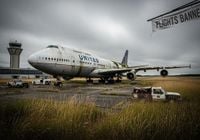United Airlines is making significant changes to its regional transportation network and domestic flight offerings as it navigates evolving market demands and strategic priorities in 2025. The airline recently announced the termination of two United-branded bus routes operated by Landline, a luxury bus service partner that integrates ground transportation with airline itineraries. At the same time, United is scaling back its domestic flight capacity amid shifting passenger preferences favoring international travel, a move reflective of broader industry trends.
Since 2021, United has collaborated with Landline to provide seamless regional connections via bus services that complement its flight network. These services included routes such as the Northern Colorado Regional Airport (FNL) in Fort Collins to Denver International Airport (DEN), and Lehigh Valley International Airport (ABE) in Allentown, Pennsylvania, to Newark Liberty International Airport (EWR). However, United and Landline have decided to end their partnership, with the FNL-DEN bus service concluding on July 31, 2025, and the ABE-EWR route ceasing on September 1, 2025.
Nick Johnson, Vice President of Landline, explained the decision by stating, "We did make the decision to discontinue our partnership with United to focus on other commercial opportunities." A United spokesperson confirmed that the routes will end as Landline shifts its focus, adding that the airline is proactively reaching out to affected customers to offer refunds or alternative bookings.
Landline operates under capacity-purchase agreements akin to regional airlines, with tickets bought as part of United itineraries. Its buses feature a luxury interior designed to mimic airline cabins, boasting 35 seats with ample legroom, tray tables, and complimentary WiFi, arranged in a two-by-one seating configuration. Despite the end of the United partnership, Landline will continue independent bus operations between FNL and DEN, increasing daily service frequencies to 17 trips. However, these independent services will no longer integrate with airline bookings, requiring passengers to arrange bus and flight segments separately.
Beyond United, Landline maintains contracts with other major carriers, including Air Canada, American Airlines, and Sun Country Airlines. It continues to operate American Airlines-branded secure-to-secure bus services linking ABE and Philadelphia International Airport (PHL), as well as from Atlantic City, Wilkes-Barre/Scranton, Wilmington, and soon Trenton-Mercer Airport (TTN) in New Jersey, where service is slated to commence in late September 2025. The secure-to-secure nature of these routes allows passengers to clear security at the regional airport and be dropped off airside at Philadelphia without re-screening or collecting checked bags, streamlining the travel experience.
In contrast, United’s discontinued Landline routes were not secure-to-secure, requiring passengers to clear security separately at their connecting airports. Landline also operates Air Canada-contracted landside-to-landside services from Region of Waterloo and Hamilton International Airports to Toronto Pearson International Airport. Efforts are underway with Transport Canada to transition these to secure-to-secure services, with plans to expand Landline’s footprint in Canada. Additionally, Landline runs landside-to-landside routes for Sun Country Airlines between Duluth, Minnesota, and Minneapolis-St. Paul International Airport.
Looking ahead, Landline is actively negotiating with various North American airlines and airports to establish new routes, with Johnson teasing, "I can’t share the upcoming operations yet, other than [already announced] TTN-PHL. Stay tuned."
Meanwhile, United Airlines is also adjusting its broader flight network. The carrier recently confirmed the cancellation of two domestic routes: Denver to Fort Collins (DEN-FNL), ending July 31, 2025, and Newark to Allentown (EWR-ABE), ending September 1, 2025. These cuts come amid a strategic shift to reduce domestic flight capacity by approximately 4% starting in the third quarter of 2025, particularly targeting off-peak domestic services where passenger demand has softened.
United currently operates about 235 domestic flights and serves 138 international cities across 60 countries. However, the airline has not publicly detailed specific reasons for the recent route cancellations. Passengers affected by these changes are being offered options to re-route or receive partial refunds.
This domestic trimming aligns with a broader industry pattern. Other major airlines, including Delta Air Lines and Frontier Airlines, are similarly scaling back domestic growth plans to focus on more lucrative international routes. CNBC reported that United aims to match disappointing domestic travel demand while capitalizing on strong bookings for pricier international trips, especially during the summer travel season.
Economic factors such as consumer sentiment influenced by trade tensions, government layoffs, and other uncertainties appear to be weighing on domestic travel demand. Additionally, some observers speculate that decreased travel activity from Canada may be impacting U.S. domestic flight volumes. Continental flights between the U.S., Canada, and Mexico are sometimes classified as domestic, and United serves as a key carrier for Canadian travelers connecting through U.S. hubs. This dynamic could be contributing to the domestic demand softness.
The reaction among travelers has been mixed. Some understand United’s focus on profitability and market realities, while others express frustration over reduced flight options, especially in smaller markets where United is the sole carrier. One traveler noted the inconvenience of reduced flights leading to overnight stays or car rentals, while another commented on the oddity of international vacations being more affordable than domestic trips.
United’s decisions reflect its intent to optimize its route network for profitability and passenger demand, balancing domestic service reductions with international expansion. The airline continues to enhance its MileagePlus loyalty program and add international destinations, aiming to attract travelers willing to pay premium fares. Whether this trend will persist into the fall and beyond remains to be seen, as airlines monitor evolving market conditions and traveler preferences.
In sum, United Airlines is reshaping its regional and domestic operations amid shifting travel patterns. The end of its Landline partnership marks a notable change in regional connectivity, while the scaling back of domestic flights underscores the airline’s strategic pivot toward international markets. Passengers should stay informed of these changes and explore alternative options as the industry adapts to new realities.

